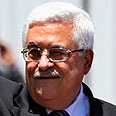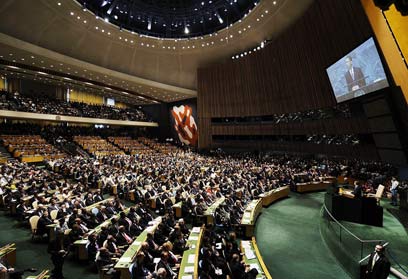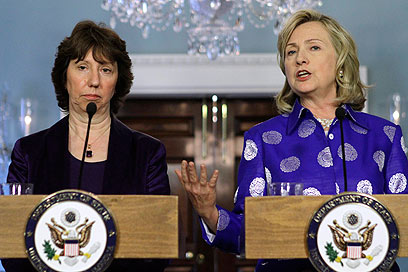

The Palestinian Authority has spent the past few days trying to advance a move to soften its bid for recognition at the UN in order to gain wider support among European nations, Ynet has learned. Europe's major powers have yet to decide whether to support the Palestinians' membership bid, to which the US is opposed.
Palestinian sources close to negotiations with Europe told Ynet that the PA is conducting secret talks with the European Union and the Arab League aimed at revising their proposed resolution ahead of the General Assembly meeting in September.
- Receive Ynetnews updates
directly to your desktop
According to the proposed version, the PLO's status within UN institutes will be significantly upgraded but without an official declaration of independence. Also, the revised proposal will leave room for the resumption of peace negotiations between Israel and the Palestinians.
A Palestinian official confirmed that the PA fears that major European powers will not endorse the UN bid and has therefore decided to try to revise the proposal.
He stressed that one way or another the PA will turn to the UN but that it remains to be decided whether the Palestinians will seek full recognition for a state or an upgrade to the status of the PLO.
The source estimated that a final decision will be made after EU foreign affairs chief Catherine Ashton visits Ramallah and meets with President Mahmoud Abbas on August 27. An Arab League meeting next week may also influence the PA's decision.
Meanwhile, Israeli sources maintaining close ties with the Palestinians said that the PA fears a declaration of independence but is having a hard time withdrawing its bid.
"They're looking for a new formula to prevent a situation where Netanyahu obtains the 'moral majority' he's talking about," they said.
While any Palestinian bid for recognition is slated to easily gain approval at the General Assembly, which is dominated by Third World countries and Muslim states, Israel still hopes to obtain a "moral majority" of major European powers, thereby diminishing the weight of the vote.
Ramallah and Jerusalem are both fighting for the German, French and British votes in particular. Germany has already announced it will oppose recognition of a Palestinian state, whereas France and Britain have yet to clarify their stances.
Israeli state officials recently estimated that Britain will ultimately align itself with the US, which has called on the Palestinians to avoid unilateral steps.
Quartet envoy to the Middle East Tony Blair has spent the last few days trying to revive peace talks between Israel and the Palestinians but any resumption of negotiations prior to September appears unlikely. Israel does not believe the Palestinians are ready to resume talks before the General Assembly convenes next month.
Palestinian sources stated that an official decision to change the form of the proposal has yet to be made but noted that intense efforts are being held. Ynet also learned that senior Israeli officials are looking into the option of forcing the PA to withdraw its bid for recognition at the International Court of Justice. Such recognition will allow the Palestinians to file lawsuits against Israel.
Meanwhile, Abbas is trying to distance himself from reconciliation talks with Hamas. "Now, with all efforts focused on September, we want all voices to be with us," a senior Fatah official told AP. "We are not giving the Americans or anyone else a reason to shun us because of the reconciliation or anything else."
"If we form a government with Hamas that Hamas wants, the US and Israel will get the pretext they need to create troubles for us before September, and that would affect our efforts to gain the recognition we want at the UN," said Ameen Maqbool, a member of the Fatah delegation to negotiations with Hamas.
AP and Elior Levy contributed to this report
- Follow Ynetnews on Facebook

















